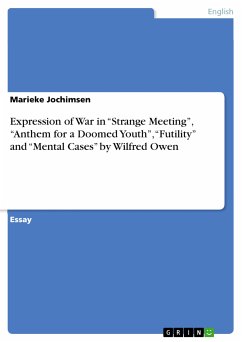Essay from the year 2007 in the subject English Language and Literature Studies - Literature, grade: 1,9, University of Münster (Englisches Seminar), course: Reading and Analytical Writing, language: English, abstract: The four poems “Futility”, “Mental Cases”, “Anthem for a Doomed Youth” and “Strange Meeting” by Wilfred Owen are all concerned with the physical and mental consequences of war. In the following these poems are being compared and analysed as to the question whether they treat basically the same themes or are of fundamental differences. Owen, who volunteered to fight in World War I, witnessed the horrors of war himself. After traumatic experiences he was diagnosed as suffering from the shell shock and was sent home. In these poems, which were all written immediately after his war service, he confronts the reader with the horrors of war. As he says in his famous statement, his poems are not meant to be beautiful, as poetry was considered to be during this time, they rather create a vision of pity, futility and tragedy: “My subject is war and the pity of war. The poetry is in the pity.”

